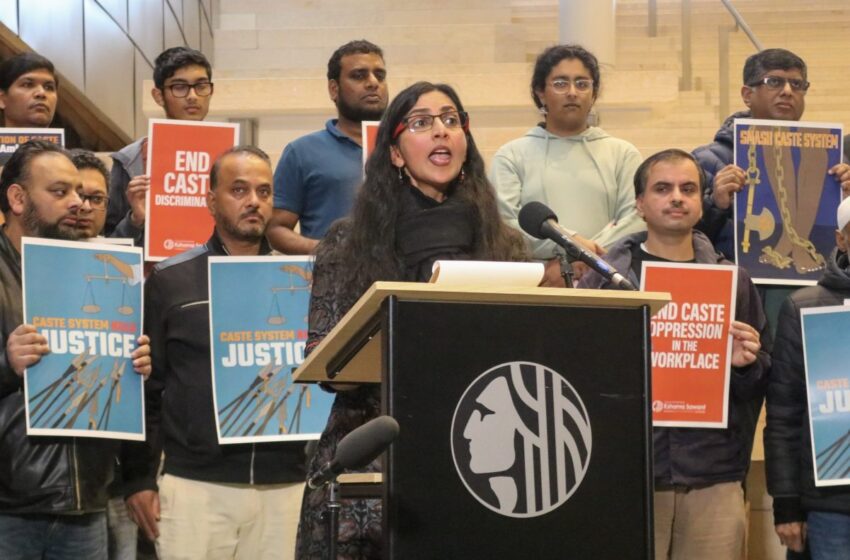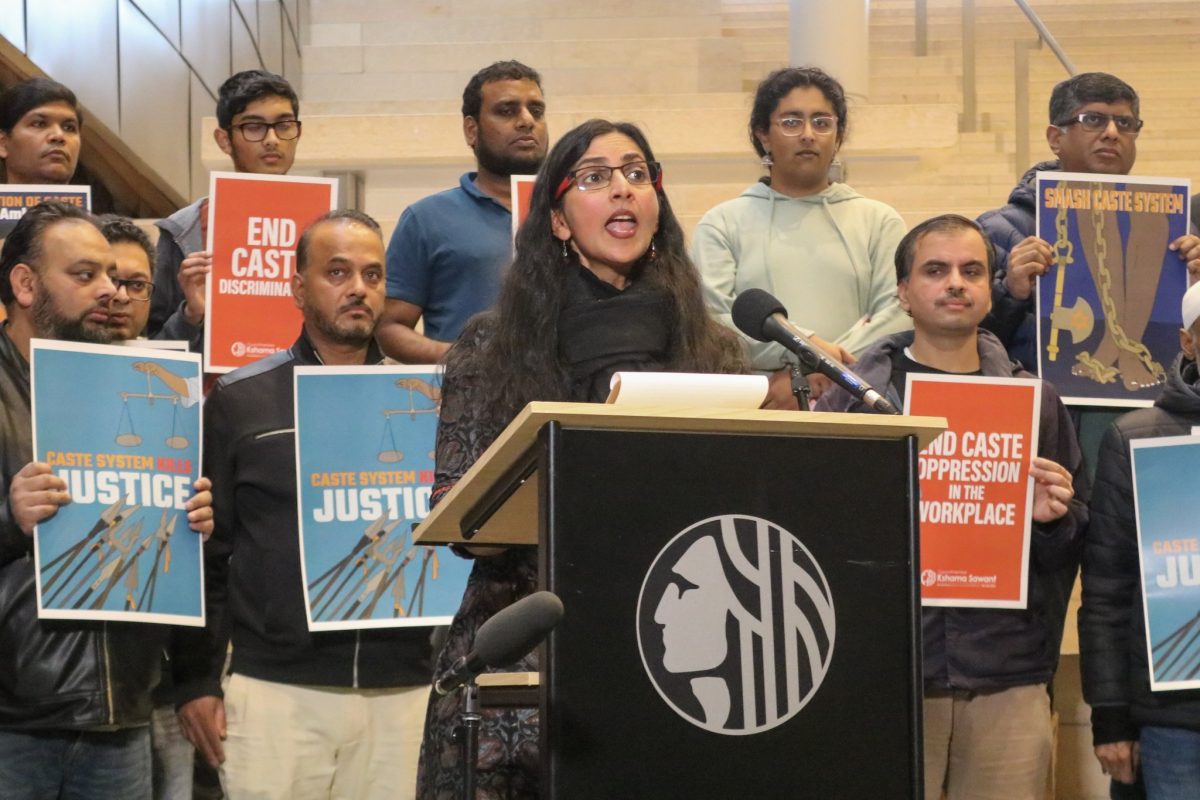Seattle becomes first US city to ban caste discrimination

 Kshama Sawant, Indian American council member behind the legislation, wants “to spread this victory around the country”
Kshama Sawant, Indian American council member behind the legislation, wants “to spread this victory around the country”
In a historic step, the Seattle City Council on Tuesday added caste to the city’s anti-discrimination laws, becoming the first US city to ban caste discrimination.
Tensions within the community were visible at Seattle City Hall on Tuesday as a noisy hearing culminated with a 6-1 vote over the historic legislation sponsored by the council’s lone socialist Indian American member Kshama Sawant.
Read: Seattle considers historic law barring caste discrimination (February 21, 2023)
The majority of the council agreed that caste discrimination crosses national and religious boundaries and that without such laws, those facing caste discrimination in the US will have no protections.
“It’s official: our movement has WON a historic, first-in-the-nation ban on caste discrimination in Seattle! Now we need to build a movement to spread this victory around the country,” Mumbai born social activist tweeted after the vote.
Indian American Congresswoman Pramila Jayapal, whose constituency includes most of Seattle, tweeted her support for the legislation.
“I’m proud to see Seattle leading the country by taking steps to end this discrimination and ensure that all people are able to live freely and thrive,” wrote Jayapal who heads the Congressional Progressive Caucus.
The packed council room overflowed with activists from both sides bearing banners, chanting slogans, challenging speakers and city officials as they made their comments.
As council members voted in favor of the ordinance, the chamber erupted into cheers of “Jai Bhim,” which means “victory for Bhim” a rallying cry adopted by followers of B R Ambedkar, an Indian Dalit rights icon whose given name was Bhimrao.
The legislation, modeled after laws against racial bias, seeks to ban caste-based discrimination in jobs, housing rental and sales and in public places like hotels, restaurants and stores.
Read: Kshama Sawant introduces first law to ban caste discrimination (January 25, 2023)
The movement to outlaw discrimination based on caste has also been getting pushback from some Hindu Americans who argue that such legislation maligns a specific community.
Sawant said her legislation does not single out one community, but it accounts for how caste discrimination crosses national and religious boundaries. Sawant said the council received over 4,000 emails in support of the ordinance.
“We’ve heard hundreds of gut-wrenching stories over the last few weeks showing us that caste discrimination is very real in Seattle,” she said.
Council Member Sara Nelson who cast the lone dissenting vote agreed with opponents calling the ordinance “a reckless, harmful solution to a problem for which we have no data or research.”
“This could generate more anti-Hindu discrimination and could dissuade employers from hiring South Asians,” she said. “The community that is being impacted is deeply divided on this issue.”
Nelson also said the ordinance would also get the city entangled in legal battles to which Sawant responded: “Bring it on.” Being fearful of lawsuits is not the way to effect progress or change, she said.
Earlier Tuesday morning, several activists braved cold temperatures and wind gusts to line up outside City Hall so they would get a chance to speak to the council before the vote.
But the council restricted public comment at the meeting where more than 300 people had requested to speak virtually and in person. They heard about half of the comments before moving on to deliberations and the vote.
Read: Kshama Sawant to launch ‘Workers Strike Back’ movement (January 23, 2023)
Thenmozhi Soundararajan, executive director of Oakland, California-based Equality Labs, whose advocacy work along with community partners continues to push caste discrimination laws forward, called the council vote “a culture war that has been won.”
“We got the support of over 200 organizations from Seattle and around the country,” she said. “It’s a powerful message that Dalit people are not alone. The South Asian community has united to say we want to heal from the trauma of caste.”
Suhag Shukla, co-founder and executive director of the Hindu American Foundation, said that caste discrimination is wrong and violates core Hindu principles.
But he said the new law sent a message “that our community, which makes up less than 2% of the population, is so uniquely bigoted that we need a special category under the law to police us, reinforcing xenophobic stereotypes we had hoped the US had moved beyond”.
The group plans to explore legal options. They are currently suing the state of California in a federal court for a “similarly unconstitutional definition of caste” and assisting with a challenge to Cal State’s addition of caste to its non-discrimination policy – arguing that the “addition of caste singles out one community for ethnic profiling and additional policing”.
The Seattle legislation was supported by a union representing student employees of the University of Washington, the Washington unit of the American Civil Liberties Union, the Indian American Muslim Council, the Ambedkar Association of North America and the Ambedkar International Centre.
Read: Seattle City Council considers historic law barring caste discrimination (February 20, 2023)
Over the past three years, several colleges and university systems have moved to prohibit caste discrimination. In December 2019, Brandeis University near Boston became the first US college to include caste in its nondiscrimination policy.
The California State University System, Colby College, Brown University and the University of California, Davis have all adopted similar measures. Harvard University instituted caste protections for student workers in 2021 as part of its contract with its graduate student union.

